牛津译林版七年级上册 Unit 4 My day Period 5 Task & Self-assessment 课件 (共43张PPT)
文档属性
| 名称 | 牛津译林版七年级上册 Unit 4 My day Period 5 Task & Self-assessment 课件 (共43张PPT) |
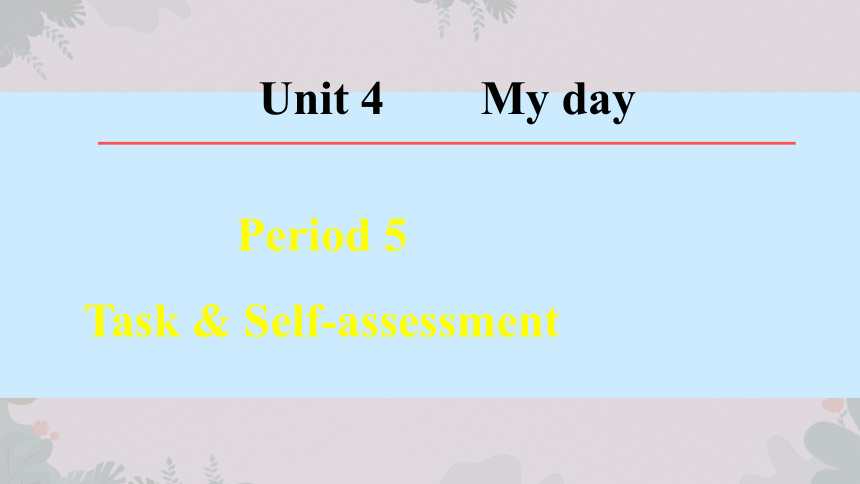
|
|
| 格式 | pptx | ||
| 文件大小 | 4.3MB | ||
| 资源类型 | 教案 | ||
| 版本资源 | 牛津译林版 | ||
| 科目 | 英语 | ||
| 更新时间 | 2023-09-24 18:22:02 | ||
图片预览



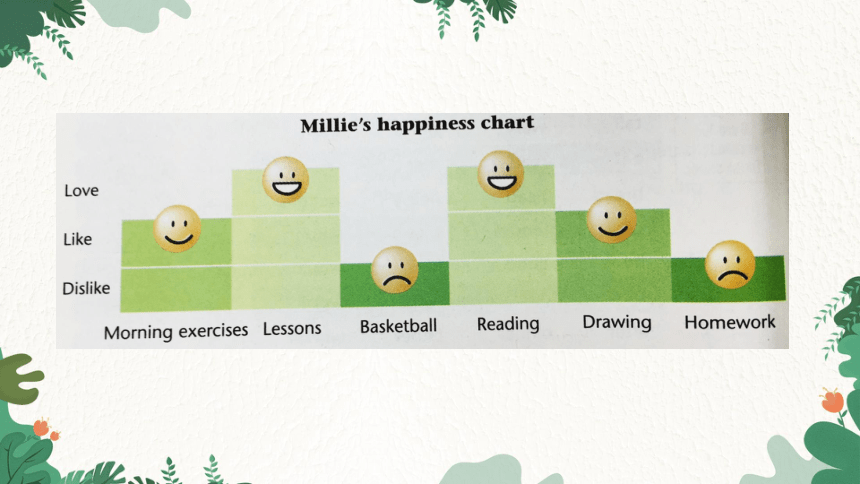
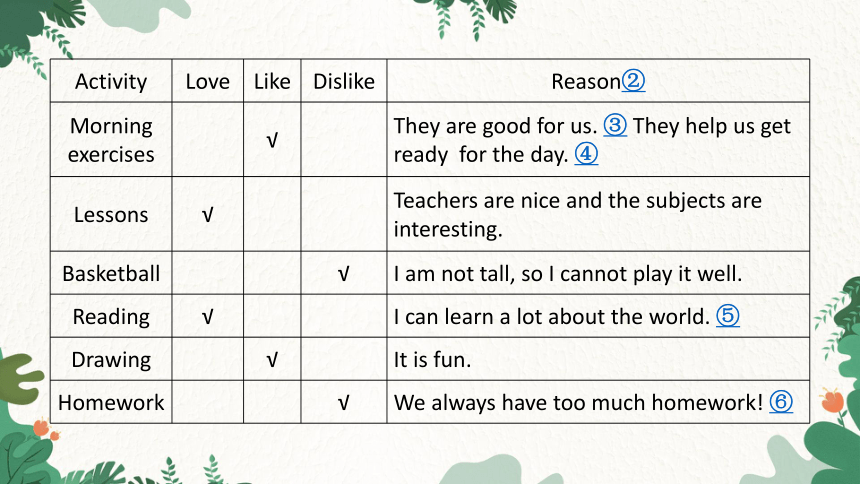

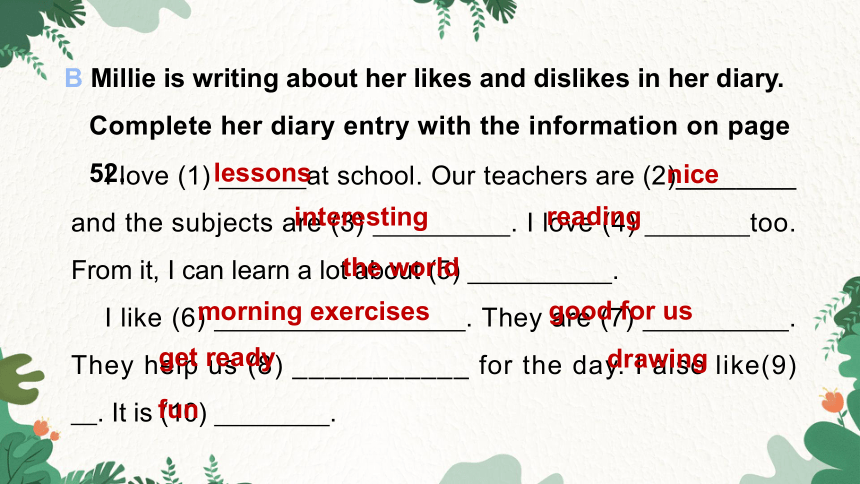
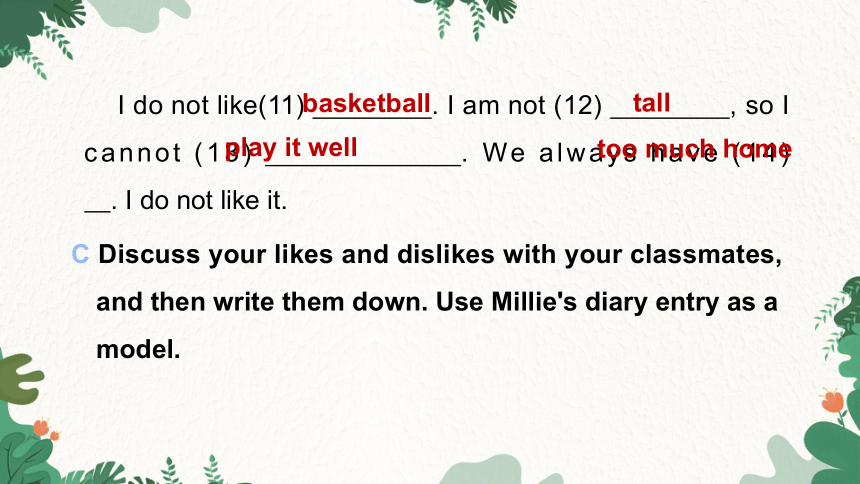
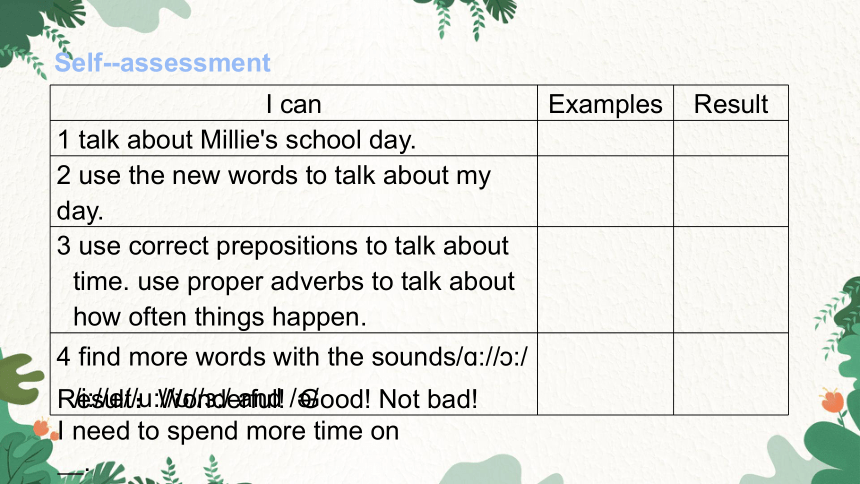

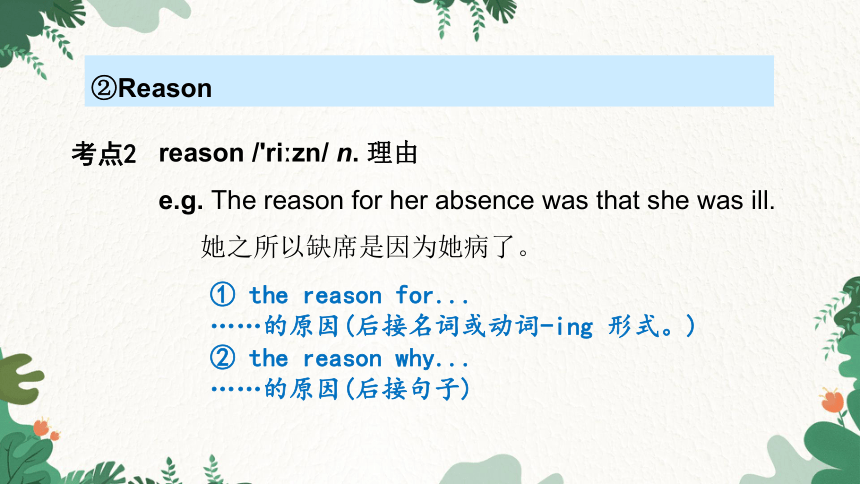
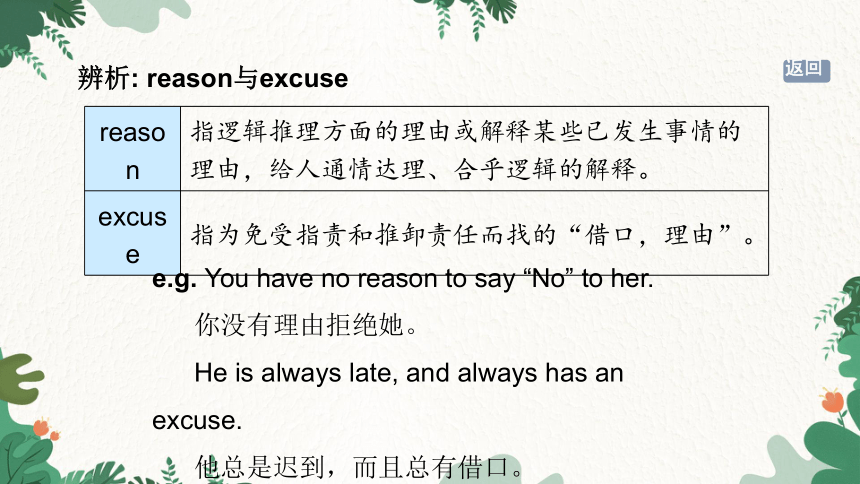
文档简介
(共43张PPT)
Period 5
Task & Self-assessment
Unit 4 My day
Like or Dislike
A Look at Millie's happiness chart. Then read about Millie's likes and dislikes in the table below.
Love Like Dislike ①
Morning exercises Lessons Basketball
Reading Drawing Homework
Task
温馨提示:此符号表示“考点精讲解析”链接。
Activity Love Like Dislike Reason②
Morning exercises √ They are good for us. ③ They help us get ready for the day. ④
Lessons √ Teachers are nice and the subjects are interesting.
Basketball √ I am not tall, so I cannot play it well.
Reading √ I can learn a lot about the world. ⑤
Drawing √ It is fun.
Homework √ We always have too much homework! ⑥
Useful expressions
I like/do not like. . . . My favourite subject(s) is/are. . . .
I can learn a lot about. . . . It helps me. . . .
It is fun/interesting. I cannot. . . , so. . . .
We always have. . . .
B Millie is writing about her likes and dislikes in her diary. Complete her diary entry with the information on page 52.
I love (1) at school. Our teachers are (2)________ and the subjects are (3) . I love (4) too. From it, I can learn a lot about (5) .
I like (6) . They are (7) . They help us (8) ___________ for the day. I also like(9) . It is (10) .
lessons
nice
interesting
reading
the world
morning exercises
good for us
get ready
drawing
fun
I do not like(11) . I am not (12) , so I cannot (13) . We always have (14) . I do not like it.
too much home
basketball
tall
play it well
C Discuss your likes and dislikes with your classmates, and then write them down. Use Millie's diary entry as a model.
Self- assessment
I can Examples Result
1 talk about Millie's school day.
2 use the new words to talk about my day.
3 use correct prepositions to talk about time. use proper adverbs to talk about how often things happen.
4 find more words with the sounds/ɑ:// :/ /i://e//u:// //з:/ and / /
Result:Wonderful! Good! Not bad!
I need to spend more time on .
①Dislike
dislike /d s'la k/ n. 不喜爱,厌恶
e.g. What is your dislike
你不喜欢什么?
Why do you dislike him going with you
你为什么讨厌他和你一起去呢?
I dislike being away from my family.
我不喜欢同家人分开。
考点1
否定前缀dis- 加like 构成的名词
作名词
①dislike doing sth.
不喜欢做某事
②dislike sb.doing sth.不喜欢某人做某事
dislike 还可作动词,意为“不喜欢,厌恶”。
返回
温馨提示:可返回原文
②Reason
reason /'ri zn/ n. 理由
e.g. The reason for her absence was that she was ill.
她之所以缺席是因为她病了。
考点2
① the reason for...
……的原因(后接名词或动词-ing 形式。)
② the reason why...
……的原因(后接句子)
辨析: reason与excuse
reason 指逻辑推理方面的理由或解释某些已发生事情的理由,给人通情达理、合乎逻辑的解释。
excuse 指为免受指责和推卸责任而找的“借口,理由”。
e.g. You have no reason to say “No” to her.
你没有理由拒绝她。
He is always late, and always has an excuse.
他总是迟到,而且总有借口。
返回
③They are good for us.
be good for... 对……有好处
e.g. It is good for us to learn English well.
学好英语对我们有好处。
Sports are good for us. 运动对我们有好处。
Doing morning exercises is good for our health.
做早操对我们的健康有好处。
Watching TV too much is bad for our eyes.
看电视太多对我们的眼睛有害。
考点3
介词for 后常接名词或代词。
be good for ... 的反义短语,意为“对……有坏处”。
中考在线1:—I think washing hands every day is good ________ our health.
—Yes, I agree ________ you. [滨州]
A. to; to B. with; to C. for; with D. at; with
C
【解析】本题用固定搭配法。be good for 有益于;agree with sb. 同意某人的观点。根据第一空后的our health 可知,此处表示有利于健康,用be good for;第二空后宾语you 表示人,表示同意你的观点,用短语agree with。
返回
④They help us get ready for the day.
ready /'redi/ adj. 准备好,准备完毕
e.g. Are you ready 你们准备好了吗?
He is always ready to help others.
他总是乐意帮助别人。
They help us get ready for the party.
他们帮助我们为聚会做好准备。
考点4
be/get ready to do sth.
准备做某事
be ready to do sth.
乐于做某事
be/get ready for sth. 为某事做好准备
返回
⑤I can learn a lot about the world.
learn /l n/ v. 学,学习,学会
e.g. People want to learn more about the moon.
人们想更多地了解月球。
Tom and Jim learn from each other.
汤姆和吉姆互相学习。
It’s important for students to learn English well.
学好英语对学生们来说是重要的。
考点5
既可作及物动词也可作不及物动词
learn a lot about... 了解许多有关……的知识/情况
learn about
了解,获悉
learn from sb.
向某人学习
learn to do sth.
学习做某事
world /w ld/ n. 世界
e.g. Which is the biggest city in the world
世界上最大的城市是哪个?
考点6
world 的常用搭配:
①in the world 世界上
②a map of the world 一张世界地图
③all over the world 遍及世界
返回
⑥We always have too much homework!
(高频) too much 太多
考点7
辨析: too much,too many 与 much too
too much 太多,形容词词组,用来修饰不可数名词。
太多,副词词组,在句中作状语,修饰动词。
too many 太多,用来修饰可数名词复数。
much too 非常,后跟形容词或副词。
e.g. She spends too much money on clothes.
她花太多钱买衣服。
You worry too much. 你担心得太多。
I have too many books to read. 我有太多的书要读。
速记小法:too many、too much与much too 的用法:
too much, much too,用法区别看后头,much 后接不可数,too 后则接形或副。too many 要记住,其后名词必复数。
中考在线2:We shouldn’t watch _________ TV and we shouldn’t watch _________ films, either.
A. too much; too many B. too many; too much
C. too much; too much D. too many; too many
【解析】句意:我们不应该看太多的电视,也不应该看太多的电影。TV 是不可数名词,要用too much 修饰;films 是可数名词,要用too many 修饰。
A
返回
本单元的话题是我的一天。
以下图片是Peter 一天的生活情况。
单元话题
Peter 的老师和同学们非常想了解他的生活,请你根据上面的八幅图片,以Peter’s Day 为题,描述Peter 一天的生活情况,词数约为70。要求:语句通顺连贯。
审题指导
本题是根据图片内容写出Peter 一天的活动情况。写作前要仔细看每幅图片,观察图片中的主人翁在做什么,结合图下面所给的时间,用恰当的句子把图中的动作表达出来。然后将句子组成短文。
写作方法
“两步三要素法”介绍某人的一天
两步:
步骤一:点明人物
步骤二:按时间顺序介绍有关活动
三要素:
要素一:人物
要素二:时间
要素三:活动
易错点提示
(一)注意时态。常用一般现在时。若主语为第三人称单数,注意动词的形式。
(二)短文要有条理。
(三)不能遗漏要点,也不能把某一方面写得过多。
写作模板
“两步三要素法”介绍某人的一天 人物 Peter is my best friend.
时间 ·at 6:30 ·at 7: 00
·at 7: 45 ·at 8:00
...
活动 ·get up ·have breakfast
·go to school ·do morning exercises
·have lessons
...
经典词句
单词 friend, breakfast, exercise, begin, lunch, lesson, afternoon, homework
短语 get up, have breakfast, go to school, do morning exercises, have lessons, have lunch, in the afternoon, play
basketball, at that time (在那时), do one’s homework, at home, go to bed
句式 1. He/ She gets up at...
2. He/ She has breakfast at...
3. He/ She goes to school at...
4. He/ She does morning exercises at...
5. He/ She begins to have lessons at...
6. He/ She plays basketball at...
7. He/ She does his/ her homework at...
8. He/ She goes to bed at...
范文赏析
Peter’s Day
Peter is my best friend. He gets up at 6:30 every morning. Then he has breakfast at 7:00. After that, he goes to school. At 7:45,he does morning exercises. At 8:00 he begins to have lessons. He has lunch at 12:00. He has two lessons in the afternoon. Classes are over at 4:30 p.m. He often plays basketball at that time. At 7:30 p.m., he does his homework at home. At about 9:30 p.m., he goes to bed.
名师点评
本文运用了“两步三要素法”介绍了彼得一天的生活,全文采用了第三人称,用一般现在时介绍了他早、中、晚的一些活动。
添彩点:本文第一句开门见山地介绍了写作的对象; 按时间顺序介绍了一天的活动,层次分明,简洁明了,同时运用了短语:have breakfast, go to school, do morning exercises, play basketball, do his homework, go to bed。
1. My little brother ____________(不喜欢) orange juice.
2. You can buy a map of the ____________ (世界).
3. Morning exercises help us get r for the day.
4. These books are very i . We all like to read them.
5. I have no ____________ (理由) to say “No”.
一、根据句意及首字母或汉语提示完成单词
dislikes
world
eady
nteresting
reason
6. —Do you like her friends
—Yes. One of her friends often _________ her _________ her English in the class.
A. help; with B. help; to do
C. helps; doing D. helps; with
二、单项选择
D
【解析】主语是One of her friends,动词用单数形式,help sb. with sth. 帮助某人做某事。
7. My brother has _________ things to do, but he always says he doesn’t have _________ time.
A. too many; too many B. too many; too much
C. too much; too many D. too much; too much
B
【解析】too much 修饰不可数名词;too many 修饰可数名词复数,故选B。
8. We have a class meeting _________ Monday morning.
A. at B. in C. on D. of
C
【解析】在具体某一天或具体某一天的上午、下午、晚上用介词on。
9. —I’m _________ school.
—But your English book is still on the desk.
A. ready for B. good at
C. afraid of D. happy with
A
【解析】考查短语的用法。由答语“但你的英语书还在桌上。”可知上一句句意为“我准备好上学了。”be ready for 准备好……。故选A。
10. Sports are good _________ us. But I’m not good _________ them.
A. at; at B. at; for
C. for; at D. for; for
C
【解析】be good for...“对……有好处”; be good at... “擅长……”。故选C。
11. 我喜欢运动。它们对我有好处。
I like _________. They ________________ me.
12. 李先生了解许多有关他儿子的情况。
Mr Li ___________________ his son.
三、根据汉语意思完成句子,每空词数不限
sports are good for
learns a lot about
13. 他们每天有太多的家庭作业要做。
They have ___________ homework to do every day.
14. 我们来为聚会做好准备吧。
Let’s _______________ the party.
15. 他的朋友遍及世界。
He has friends ____________________.
too much
get ready for
all over the world
What do I do every day
I usually get up e 16 in the morning. I h 17 my breakfast at seven. I have bread and milk for breakfast. I l 18 home at about seven thirty. I’m never l 19 for school. I have four c 20 in the morning. At about twelve I come home
f 21 lunch.
四、根据短文内容及首字母提示完成短文
arly
ave
eave
ate
lasses
or
In the afternoon I’m not so busy. After school I do my homework and play w 22 other children.
In the evening my parents come back from w 23. We have supper together. After that we usually read newspapers or watch TV. S 24 I go to bed at ten. But my father
o 25 works late at night.
ith
ork
ometimes
ften
本节课主要学习了以下知识点,请同学们及时巩固练习:
be good for
help sb. do sth.
too much
谢谢大家!
Period 5
Task & Self-assessment
Unit 4 My day
Like or Dislike
A Look at Millie's happiness chart. Then read about Millie's likes and dislikes in the table below.
Love Like Dislike ①
Morning exercises Lessons Basketball
Reading Drawing Homework
Task
温馨提示:此符号表示“考点精讲解析”链接。
Activity Love Like Dislike Reason②
Morning exercises √ They are good for us. ③ They help us get ready for the day. ④
Lessons √ Teachers are nice and the subjects are interesting.
Basketball √ I am not tall, so I cannot play it well.
Reading √ I can learn a lot about the world. ⑤
Drawing √ It is fun.
Homework √ We always have too much homework! ⑥
Useful expressions
I like/do not like. . . . My favourite subject(s) is/are. . . .
I can learn a lot about. . . . It helps me. . . .
It is fun/interesting. I cannot. . . , so. . . .
We always have. . . .
B Millie is writing about her likes and dislikes in her diary. Complete her diary entry with the information on page 52.
I love (1) at school. Our teachers are (2)________ and the subjects are (3) . I love (4) too. From it, I can learn a lot about (5) .
I like (6) . They are (7) . They help us (8) ___________ for the day. I also like(9) . It is (10) .
lessons
nice
interesting
reading
the world
morning exercises
good for us
get ready
drawing
fun
I do not like(11) . I am not (12) , so I cannot (13) . We always have (14) . I do not like it.
too much home
basketball
tall
play it well
C Discuss your likes and dislikes with your classmates, and then write them down. Use Millie's diary entry as a model.
Self- assessment
I can Examples Result
1 talk about Millie's school day.
2 use the new words to talk about my day.
3 use correct prepositions to talk about time. use proper adverbs to talk about how often things happen.
4 find more words with the sounds/ɑ:// :/ /i://e//u:// //з:/ and / /
Result:Wonderful! Good! Not bad!
I need to spend more time on .
①Dislike
dislike /d s'la k/ n. 不喜爱,厌恶
e.g. What is your dislike
你不喜欢什么?
Why do you dislike him going with you
你为什么讨厌他和你一起去呢?
I dislike being away from my family.
我不喜欢同家人分开。
考点1
否定前缀dis- 加like 构成的名词
作名词
①dislike doing sth.
不喜欢做某事
②dislike sb.doing sth.不喜欢某人做某事
dislike 还可作动词,意为“不喜欢,厌恶”。
返回
温馨提示:可返回原文
②Reason
reason /'ri zn/ n. 理由
e.g. The reason for her absence was that she was ill.
她之所以缺席是因为她病了。
考点2
① the reason for...
……的原因(后接名词或动词-ing 形式。)
② the reason why...
……的原因(后接句子)
辨析: reason与excuse
reason 指逻辑推理方面的理由或解释某些已发生事情的理由,给人通情达理、合乎逻辑的解释。
excuse 指为免受指责和推卸责任而找的“借口,理由”。
e.g. You have no reason to say “No” to her.
你没有理由拒绝她。
He is always late, and always has an excuse.
他总是迟到,而且总有借口。
返回
③They are good for us.
be good for... 对……有好处
e.g. It is good for us to learn English well.
学好英语对我们有好处。
Sports are good for us. 运动对我们有好处。
Doing morning exercises is good for our health.
做早操对我们的健康有好处。
Watching TV too much is bad for our eyes.
看电视太多对我们的眼睛有害。
考点3
介词for 后常接名词或代词。
be good for ... 的反义短语,意为“对……有坏处”。
中考在线1:—I think washing hands every day is good ________ our health.
—Yes, I agree ________ you. [滨州]
A. to; to B. with; to C. for; with D. at; with
C
【解析】本题用固定搭配法。be good for 有益于;agree with sb. 同意某人的观点。根据第一空后的our health 可知,此处表示有利于健康,用be good for;第二空后宾语you 表示人,表示同意你的观点,用短语agree with。
返回
④They help us get ready for the day.
ready /'redi/ adj. 准备好,准备完毕
e.g. Are you ready 你们准备好了吗?
He is always ready to help others.
他总是乐意帮助别人。
They help us get ready for the party.
他们帮助我们为聚会做好准备。
考点4
be/get ready to do sth.
准备做某事
be ready to do sth.
乐于做某事
be/get ready for sth. 为某事做好准备
返回
⑤I can learn a lot about the world.
learn /l n/ v. 学,学习,学会
e.g. People want to learn more about the moon.
人们想更多地了解月球。
Tom and Jim learn from each other.
汤姆和吉姆互相学习。
It’s important for students to learn English well.
学好英语对学生们来说是重要的。
考点5
既可作及物动词也可作不及物动词
learn a lot about... 了解许多有关……的知识/情况
learn about
了解,获悉
learn from sb.
向某人学习
learn to do sth.
学习做某事
world /w ld/ n. 世界
e.g. Which is the biggest city in the world
世界上最大的城市是哪个?
考点6
world 的常用搭配:
①in the world 世界上
②a map of the world 一张世界地图
③all over the world 遍及世界
返回
⑥We always have too much homework!
(高频) too much 太多
考点7
辨析: too much,too many 与 much too
too much 太多,形容词词组,用来修饰不可数名词。
太多,副词词组,在句中作状语,修饰动词。
too many 太多,用来修饰可数名词复数。
much too 非常,后跟形容词或副词。
e.g. She spends too much money on clothes.
她花太多钱买衣服。
You worry too much. 你担心得太多。
I have too many books to read. 我有太多的书要读。
速记小法:too many、too much与much too 的用法:
too much, much too,用法区别看后头,much 后接不可数,too 后则接形或副。too many 要记住,其后名词必复数。
中考在线2:We shouldn’t watch _________ TV and we shouldn’t watch _________ films, either.
A. too much; too many B. too many; too much
C. too much; too much D. too many; too many
【解析】句意:我们不应该看太多的电视,也不应该看太多的电影。TV 是不可数名词,要用too much 修饰;films 是可数名词,要用too many 修饰。
A
返回
本单元的话题是我的一天。
以下图片是Peter 一天的生活情况。
单元话题
Peter 的老师和同学们非常想了解他的生活,请你根据上面的八幅图片,以Peter’s Day 为题,描述Peter 一天的生活情况,词数约为70。要求:语句通顺连贯。
审题指导
本题是根据图片内容写出Peter 一天的活动情况。写作前要仔细看每幅图片,观察图片中的主人翁在做什么,结合图下面所给的时间,用恰当的句子把图中的动作表达出来。然后将句子组成短文。
写作方法
“两步三要素法”介绍某人的一天
两步:
步骤一:点明人物
步骤二:按时间顺序介绍有关活动
三要素:
要素一:人物
要素二:时间
要素三:活动
易错点提示
(一)注意时态。常用一般现在时。若主语为第三人称单数,注意动词的形式。
(二)短文要有条理。
(三)不能遗漏要点,也不能把某一方面写得过多。
写作模板
“两步三要素法”介绍某人的一天 人物 Peter is my best friend.
时间 ·at 6:30 ·at 7: 00
·at 7: 45 ·at 8:00
...
活动 ·get up ·have breakfast
·go to school ·do morning exercises
·have lessons
...
经典词句
单词 friend, breakfast, exercise, begin, lunch, lesson, afternoon, homework
短语 get up, have breakfast, go to school, do morning exercises, have lessons, have lunch, in the afternoon, play
basketball, at that time (在那时), do one’s homework, at home, go to bed
句式 1. He/ She gets up at...
2. He/ She has breakfast at...
3. He/ She goes to school at...
4. He/ She does morning exercises at...
5. He/ She begins to have lessons at...
6. He/ She plays basketball at...
7. He/ She does his/ her homework at...
8. He/ She goes to bed at...
范文赏析
Peter’s Day
Peter is my best friend. He gets up at 6:30 every morning. Then he has breakfast at 7:00. After that, he goes to school. At 7:45,he does morning exercises. At 8:00 he begins to have lessons. He has lunch at 12:00. He has two lessons in the afternoon. Classes are over at 4:30 p.m. He often plays basketball at that time. At 7:30 p.m., he does his homework at home. At about 9:30 p.m., he goes to bed.
名师点评
本文运用了“两步三要素法”介绍了彼得一天的生活,全文采用了第三人称,用一般现在时介绍了他早、中、晚的一些活动。
添彩点:本文第一句开门见山地介绍了写作的对象; 按时间顺序介绍了一天的活动,层次分明,简洁明了,同时运用了短语:have breakfast, go to school, do morning exercises, play basketball, do his homework, go to bed。
1. My little brother ____________(不喜欢) orange juice.
2. You can buy a map of the ____________ (世界).
3. Morning exercises help us get r for the day.
4. These books are very i . We all like to read them.
5. I have no ____________ (理由) to say “No”.
一、根据句意及首字母或汉语提示完成单词
dislikes
world
eady
nteresting
reason
6. —Do you like her friends
—Yes. One of her friends often _________ her _________ her English in the class.
A. help; with B. help; to do
C. helps; doing D. helps; with
二、单项选择
D
【解析】主语是One of her friends,动词用单数形式,help sb. with sth. 帮助某人做某事。
7. My brother has _________ things to do, but he always says he doesn’t have _________ time.
A. too many; too many B. too many; too much
C. too much; too many D. too much; too much
B
【解析】too much 修饰不可数名词;too many 修饰可数名词复数,故选B。
8. We have a class meeting _________ Monday morning.
A. at B. in C. on D. of
C
【解析】在具体某一天或具体某一天的上午、下午、晚上用介词on。
9. —I’m _________ school.
—But your English book is still on the desk.
A. ready for B. good at
C. afraid of D. happy with
A
【解析】考查短语的用法。由答语“但你的英语书还在桌上。”可知上一句句意为“我准备好上学了。”be ready for 准备好……。故选A。
10. Sports are good _________ us. But I’m not good _________ them.
A. at; at B. at; for
C. for; at D. for; for
C
【解析】be good for...“对……有好处”; be good at... “擅长……”。故选C。
11. 我喜欢运动。它们对我有好处。
I like _________. They ________________ me.
12. 李先生了解许多有关他儿子的情况。
Mr Li ___________________ his son.
三、根据汉语意思完成句子,每空词数不限
sports are good for
learns a lot about
13. 他们每天有太多的家庭作业要做。
They have ___________ homework to do every day.
14. 我们来为聚会做好准备吧。
Let’s _______________ the party.
15. 他的朋友遍及世界。
He has friends ____________________.
too much
get ready for
all over the world
What do I do every day
I usually get up e 16 in the morning. I h 17 my breakfast at seven. I have bread and milk for breakfast. I l 18 home at about seven thirty. I’m never l 19 for school. I have four c 20 in the morning. At about twelve I come home
f 21 lunch.
四、根据短文内容及首字母提示完成短文
arly
ave
eave
ate
lasses
or
In the afternoon I’m not so busy. After school I do my homework and play w 22 other children.
In the evening my parents come back from w 23. We have supper together. After that we usually read newspapers or watch TV. S 24 I go to bed at ten. But my father
o 25 works late at night.
ith
ork
ometimes
ften
本节课主要学习了以下知识点,请同学们及时巩固练习:
be good for
help sb. do sth.
too much
谢谢大家!
同课章节目录
- 预备课程
- Lesson 1 Nice to meet you !
- Lesson 2 A happy family
- Lesson 3 A nice school
- Lesson 4 You look cool !
- Lesson 5 Wonderful things
- Lesson 6 Have nice food
- Lesson 7 Enjoy our days
- Lesson 8 Let's have fun !
- Unit 1 This is me
- Unit 2 Let's play sports
- Unit 3 Welcome to our school
- Unit 4 My day
- Unit 5 Let’s celebrate
- Unit 6 Food and lifestyle
- Unit 7 Shopping
- Unit 8 Fashion
